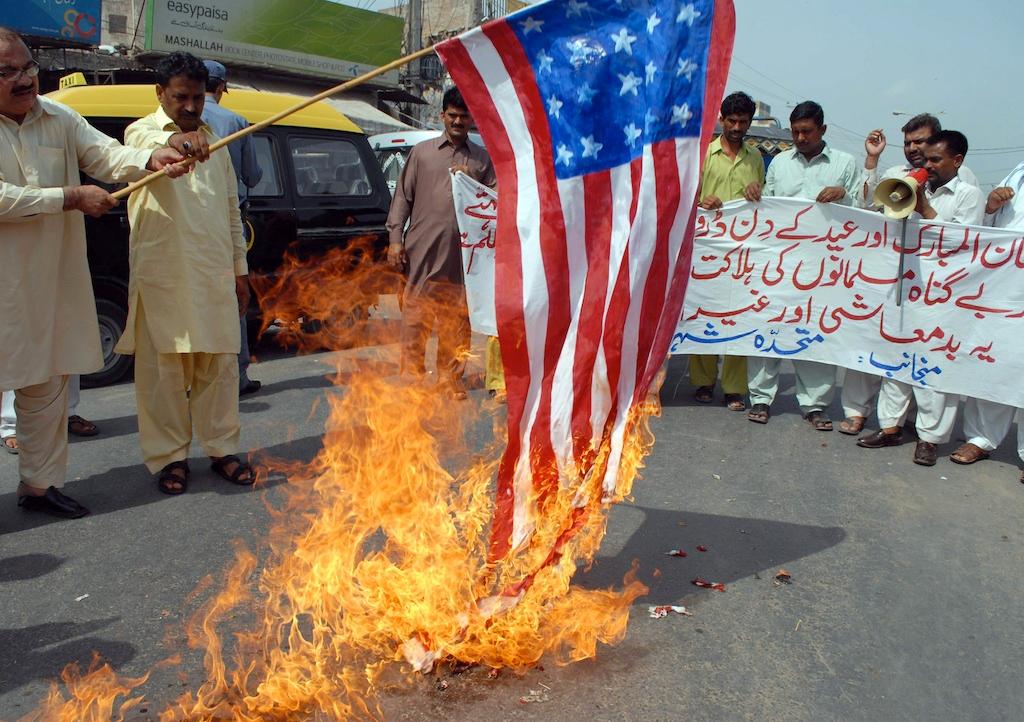Pakistan court rules US drone strikes as illegal ‘war crimes’
A Pakistani protester belonging to United Citizen Action holds a burning US flag during a protest in Multan on August 19, 2012 against the US drone attacks in Pakistani tribal areas.
A Pakistani court has ruled that US drone strikes on the country's tribal belt are illegal, urging the Pakistani government to motion for a resolution against the attacks at the United Nations.
Peshawar High Court Chief Justice Dost Muhammad Khan presided over a two-judge bench that designated the drone strikes as "war crimes" which violated the UN's charter of human rights and freedoms.
"The government of Pakistan must ensure that no drone strike takes place in the future,” the court said. “If the US vetoes the resolution, then the country should think about breaking diplomatic ties with the US."
The Foundation for Fundamental Rights, a legal charity based in Islamabad, filed the case last year on the behalf of drone strike victims' families.
The US claims that its drones target Al Qaeda and Taliban strongholds in Pakistan's rural tribal areas, not civilians. Yet several reports have found that drone strikes routinely cause civilian casualties.
The Bureau of Investigative Journalism reported that data available from June 2004 through mid-September 2012 indicates that drone strikes killed between 2,562 and 3,325 people in Pakistan, of whom 474 to 881 were civilians — including 176 children.
"In view of the established facts, undeniable in nature, under the UN Charter and Conventions, the people of Pakistan have every right to ask the security forces either to prevent such strikes by force or to shoot down intruding drones," the court verdict said, according to the Times of India.
However, Mirza Shahzad Akbar, a human rights lawyer in Islamabad who represents a number of families of victims affected by drone strikes, argued that ex-President Pervez Musharraf might be the key to the US shirking responsibility for the drone strikes.
Musharraf recently admitted that he had authorized "very few" drone strikes within Pakistan. It is the first time he has spoken about his role in collaborating with the US since he left power in 2008.
Musharraf returned to Pakistan last month after five years of self-imposed exile in London and Dubai. He did so under the false belief that he might still be popular among the people and that he might be able to reclaim power in the upcoming elections. But upon his arrival he found only hostility. Pakistanis may not be happy with the way the country is being run now, but most don't want to see the return of a dictator who brokered secret deals that resulted in the deaths of so many innocent Pakistanis.
Akbar called the court's ruling a "landmark judgment," saying that it will be a "test" for the country's new government, which will be elected in the first-ever democratic power handover tomorrow.
More from GlobalPost: Pakistan election: Will the violence end?
The story you just read is accessible and free to all because thousands of listeners and readers contribute to our nonprofit newsroom. We go deep to bring you the human-centered international reporting that you know you can trust. To do this work and to do it well, we rely on the support of our listeners. If you appreciated our coverage this year, if there was a story that made you pause or a song that moved you, would you consider making a gift to sustain our work through 2024 and beyond?
